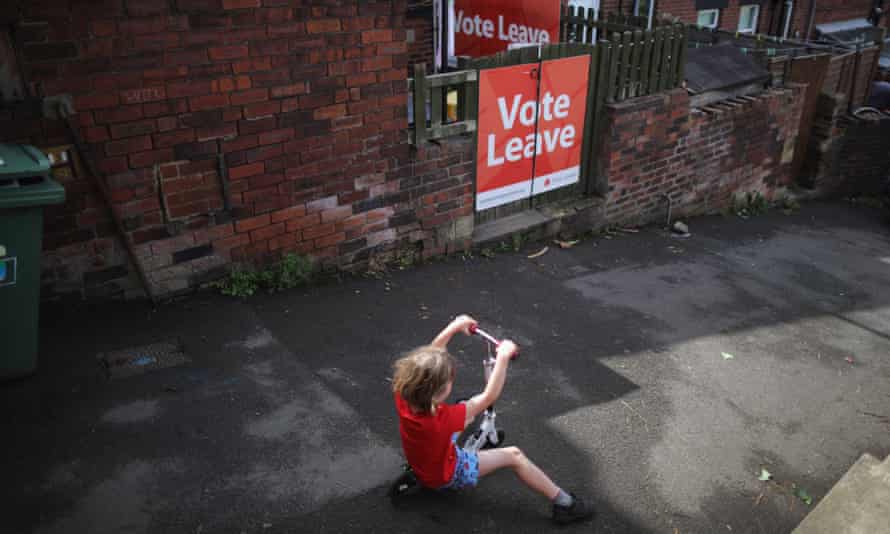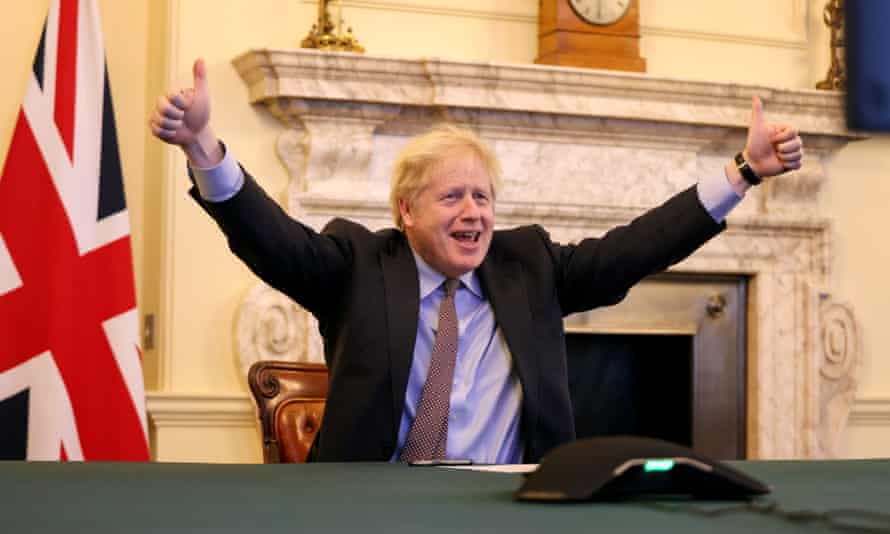
‘Culturally, Brexit plays the same sort of role as the right to buy, insulating poorer leave voters from the idea that they will suffer from the resulting policies.’ Photograph: Christopher Furlong/Getty Images
When the UK entered the coronavirus age in March, state resources and collective commitment were mobilised on a scale not seen since the second world war. Decades ago, Britain had revealed itself, thanks in part to being able to marshal the industrial might of the empire, to be a formidable world power. Its economy was energised with breakthroughs in radar, atomic power and medicine.
Although the story of the pandemic has not yet ended, there appears to be no such transformation in sight under Boris Johnson. Rather depressingly, familiar trends of greed, incompetence and cronyism are reasserting themselves. This is bad news for an economy where there has been a collapse of socially useful innovation. Britain’s lack of hi-tech manufacturing capabilities, notably in medical diagnostic testing, was cruelly exposed by the pandemic.
This country has become more of a procurer than a producer of technology. But it is a remarkably inefficient one – despite an extraordinarily high percentage of lawyers and accountants in the working population. Connections seem to matter more than inventions. How else to explain why, in the desperate scramble to procure personal protective equipment, ventilators and coronavirus tests, billions of pounds of contracts have gone to companies either run by friends or supporters – even neighbours – of Conservative politicians, or with no prior expertise.
History is not short of examples where political insiders were successful in extracting virtually all the surplus that the economy created. Such influential interests moulded politics to enlarge their share of the pie. Greed was limited only by the need to let the producers survive. The shock of war, revolution, famine or plague provides an opportunity to fix a broken society. But if, post-pandemic, UK politicians care less about reform than the retention of power, they will fail to restrain the grasping enrichment that undermines democracy itself.
When the UK entered the coronavirus age in March, state resources and collective commitment were mobilised on a scale not seen since the second world war. Decades ago, Britain had revealed itself, thanks in part to being able to marshal the industrial might of the empire, to be a formidable world power. Its economy was energised with breakthroughs in radar, atomic power and medicine.
Although the story of the pandemic has not yet ended, there appears to be no such transformation in sight under Boris Johnson. Rather depressingly, familiar trends of greed, incompetence and cronyism are reasserting themselves. This is bad news for an economy where there has been a collapse of socially useful innovation. Britain’s lack of hi-tech manufacturing capabilities, notably in medical diagnostic testing, was cruelly exposed by the pandemic.
This country has become more of a procurer than a producer of technology. But it is a remarkably inefficient one – despite an extraordinarily high percentage of lawyers and accountants in the working population. Connections seem to matter more than inventions. How else to explain why, in the desperate scramble to procure personal protective equipment, ventilators and coronavirus tests, billions of pounds of contracts have gone to companies either run by friends or supporters – even neighbours – of Conservative politicians, or with no prior expertise.
History is not short of examples where political insiders were successful in extracting virtually all the surplus that the economy created. Such influential interests moulded politics to enlarge their share of the pie. Greed was limited only by the need to let the producers survive. The shock of war, revolution, famine or plague provides an opportunity to fix a broken society. But if, post-pandemic, UK politicians care less about reform than the retention of power, they will fail to restrain the grasping enrichment that undermines democracy itself.
Windfall profits
Perhaps the most penetrating X-ray of this phenomenon today is by Brett Christophers in his book Rentier Capitalism. The academic makes the case that Britain has become a treasure island for those seeking excess profits from state-sanctioned control of natural resources, property, financial assets and intellectual property. Rent, paid by renters to rentiers, is tied to the ownership or control of such assets, made scarce under conditions of limited or no competition.
Mr Christophers says that the first sign of this new order was when Britain struck black gold in the North Sea. He writes that MPs on the public accounts committee noted with incredulity in 1972 that “the first huge areas of the sea were leased to the companies as generously as though Britain were a gullible Sheikhdom”. After that, public assets were sold off cheaply. The private sector ended up controlling lightly regulated monopolies in gas, water and electric supply, and public transport and telecoms. Customers lost out, overpaying for poor service. In a rentier’s paradise, windfall profits abound. Brazenly occupying the lowest moral ground was essential, as the housebuilder Persimmon proved by earning supersized state-backed help-to-buy profits long enough to hand out a £75m bonus to its boss.
The banks, which took this country to the brink of collapse a decade ago, are at the heart of a rentier state. France, Germany, Japan, the US all have banking sectors smaller than the UK. While banks earning rents have flourished, the households paying them – either directly as financial consumers, or indirectly as taxpayers of a debtor state or customers of debtor firms – have floundered.
The anger that such spivvery engenders is diffused politically by making voters complicit in the theft. The sell-off of council homes, says Mr Christophers, was a privatisation that gave many of those perhaps most inclined to kick against Thatcherism a personal stake in the project. Culturally, Brexit plays the same sort of role as the right to buy, insulating poorer leave voters from the idea that they will suffer from the resulting policies.
The prime minister understands that Covid can change Britain, but lacks modernising policies. He extols the virtues of free competition – both for itself and because such freedom, he reasons, will somehow liberate the spirit fluttering within a pre-Brexit Britain caged by coronavirus. He is no doubt betting that the disruption of leaving the EU will be lost in the roar of an economy taking off as an inoculated population returns to offices and shops.
Weakened regulations
The gap between rich and poor in the UK is at least as high today, academics calculate, as it was just before the start of the second world war. This is largely because the British state that once mediated the struggle between labour and capital has been taken over by rentiers. Weakening regulations, reducing the importance of fiscal policy and shredding social protections has corroded liberal democracy in which an increasingly influential wealthy few have been enjoying a free run. Ultimately, rentiers want to increase what the economist Michał Kalecki called the “degree of monopoly” in an economy. This allows them to limit the ability of workers, consumers and regulators to influence the markup of selling prices over costs and to defend the share of wages in output.
The EU says its labour, environment and customer protections are a floor, not a ceiling, and that they can’t be traded away for frictionless market access. If we had stayed in the club, our ability to concentrate profits for monopolists would have been stymied in future trade deals negotiated by Brussels and open to MEPs’ scrutiny. Outside the EU, Mr Johnson can barter away such regulations – without parliamentary oversight – and scrap safeguards in new technology for higher monopoly profits. Karl Marx wrote in The Eighteenth Brumaire of Louis Bonaparte in 1852 that “the Tories in England long fancied that they were in raptures about royalty, the church and the beauties of the ancient constitution, until a time of trial tore from them the confession that they were only in raptures about rent”. His assessment of early 19th-century Tories applies with unerring accuracy to today’s Conservatives.
Mr Christophers’ insight is that the Tories under Mr Johnson are a party of – and for – rentiers, much more than the interests of productive capital. This explains why, after 2016, the Tory party embraced Brexit and shrugged off productive capital’s concerns about leaving the EU. It will be to the great detriment of this country if the pandemic permitted Mr Johnson to combine present-day fears with a yearning for hopeful change to persuade the average person to vote against their interests in the future. But history often repeats itself first as tragedy, then as farce.
